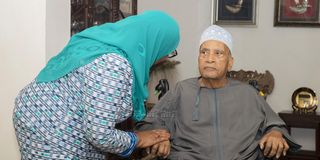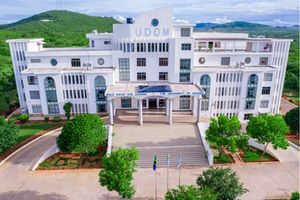Why Salim Ahmed Salim is Tanzania’s most decorated diplomat

President Samia Hassan Suluhu pays a visit to Dr. Salim at his Dar es Salaam residence on September 30, 2023. PHOTO | STATE HOUSE
What you need to know:
- Right from his youthful age, Dr Salim emerged as a protégé and emissary of Tanzania’s founding President Julius Nyerere’s policies which were deeply rooted in Africa’s struggle for liberation and independence.
Dar es Salaam. Last week, President Samia Suluhu Hassan graced the unveiling of a digital archive of former diplomat and politician Dr Salim Ahmed, featuring a superb career that spanned several decades of his service to Tanzania, Africa and indeed the whole world.
One of those who commended the move was the President of South Africa, Cyril Ramaphosa.
Commenting on his X (formerly Twitter) page, Mr Ramaphosa wrote: “I wish to commend all those involved in giving life to the @DrSalimArchive, chronicling the extraordinary work and achievements of Dr Salim Ahmed Salim”.
Mr Ramaphosa described Dr Salim as someone who had been recognised as a leading figure in the global struggle for independence, freedom, peace and cooperation.
The South African President described Dr Salim as an individual who has secured a distinctive and distinguished position in the history of Tanzania, the African continent and the United Nations.
“He will forever occupy a cherished place in the hearts of the people of South Africa for his tireless efforts to end apartheid and his commitment to the achievement of a non-racial democracy in South Africa,” he wrote adding: “This digital archive is more than a remarkable historical record. It is an affirmation of the values by which Dr Salim has lived, the mission for which he has strived and the legacy that he passes on to future generations”.
Mr Ramaphosa’s assertion concurs with what Vasu Gounden and Daniel Forti from the South Africa-based African Centre for the Constructive Resolution of Disputes (ACCORD) wrote about Dr Salim in the book titled: “Salim Ahmed Salim: Son of Africa”.
Scribbling a topic on Salim and Africa’s liberation in the 2015 book that was edited by Jakkie Cilliers, the duo describe Dr Salim as a man who played a pivotal role in supporting, coordinating and ramping up global efforts to eradicate colonialism and apartheid in his various capacities at the United Nations (UN) and the then Organisation of African Unity (OAU), and while serving in Tanzania.
“….His efforts helped to coalesce regional, continental and global diplomatic efforts in support of the liberation struggles. His urgent efforts in institutionalising dialogue and collaboration between representatives of the liberation movements and diplomats were critical in legitimising the struggle and affording greater influence to the movements in diplomatic circles,” write Vasu Gounden and Daniel Forti.
Right from his youthful age, Dr Salim emerged as a protégé and emissary of Tanzania’s founding President Julius Nyerere’s policies which were deeply rooted in Africa’s struggle for liberation and independence.
With the desire to turn him into the focal point for liberation and independence movements in Africa, Nyerere had to post Dr Salim to countries that were intensely entrenched in the thinking and philosophies of the Non-Aligned Movement (NAM).
Founded in 1961 through an initiative of the then Yugoslav President Josip Broz Tito, then Indian Prime Minister Jawaharlal Nehru, then Egyptian President Gamal Abdel Nasser, then Ghanaian President Kwame Nkrumah and Indonesia’s Sukarno, the NAM’s objective was to advance interests of developing countries in the context of Cold War confrontation.
As such, in its first three decades, the NAM played a crucial role in decolonization, formation of new independent states, and democratization of international relations.
With Tanzania is an active and prominent member state of the NAM since 1961 and Nyerere being recognized as one of the leading figures in the movement and among Third World leaders in general, Dr Salim was thus posted as Tanzania’s ambassador to Egypt from 1964 to 1965 and to India from 1965 to 1968.
According to Vasu Gounden and Daniel Forti, Dr Salim then worked as director of the Africa and Middle East Division in Tanzania’s Ministry of Foreign Affairs and as ambassador to the People’s Republic of China (1969).
“During his appointment in 1970 as Tanzania’s Permanent Representative to the UN, he served as the focal point for several of the institutions that played key roles in the liberation struggle,” write Vasu Gounden and Daniel Forti in the book which has its Forward written by Nkosazana Dlamini Zuma who was at that time the Chairperson of the African Union Commission.
Salim, Vasu Gounden and Daniel Forti say, contributed directly and indirectly to the struggle for independence and liberation at the global level.
He was also key in reinforcing efforts to secure financial and material support for liberation movements such as the South Africa’s African National Congress (ANC), Mozambique’s Frente de Libertação de Moçambique (Mozambican Liberation Front – Frelimo) and Zimbabwe’s African National Union (ZANU).
Nonetheless, being a master diplomat and strategist, Dr Salim was systematically charting and advancing a decades-long diplomatic offensive on behalf of the liberation movements and the people subjugated to colonial rule.
In doing so, Dr Salim had to navigate turbulent waters against colonial rulers in Mozambique, Zimbabwe and South Africa who had greater financial, military and institutional resources.
In 1960, the UN General Assembly (UNGA) moved a resolution – known as Resolution 1514 of December 1960 - which declared that ‘the subjection of peoples to alien subjugation, domination and exploitation constitutes a denial of fundamental human rights. With the Resolution serving as a landmark against colonialism, it was easy to establish of the
UN Special Committee on Decolonization and Salim served as its [the committee] chair from 1972 to 1980.
“During his tenure, Salim improved collaboration between the OAU’s Liberation Committee and the UN Special Committee on Decolonization, which the former Tanzanian second vice-president, Rashidi Kawawa, once referred to as the two liberation committees of historic importance in the struggle against colonialism,” Vasu Gounden and Daniel Forti write.
In April and May 1976, Salim led an ad hoc group of six members from the UN Special Committee on Decolonization to Lusaka, Dar es Salaam, Addis Ababa, Maputo, Gaborone and London to hold consultations on the decolonization efforts in Rhodesia and Namibia.
And apart from President Hassan, other notable figures who attended the unveiling of the digital archive Dr Salim in Dar es Salaam last week, were Vice President Dr Philip Mpango, Prime Minister Kassim Majaliwa and former President Jakaya Kikwete.
Born on 23rd January 1942, Dr Salim worked in the international diplomatic arena since the early 1960s until his retirement. His diplomatic postings included being appointed as the Deputy Chief Representative of the Zanzibar Office based in Havana, Cuba 1961–1962, Tanzania’s Ambassador to Egypt (1964 to 1965), India (1965 to 1968), Ambassador to the People’s Republic of China 1969 – 1970, Permanent Representative of Tanzania to the United Nations (1970 to 1980) and Tanzania’s ambassador to Cuba (1970 to 1980).
His tour of duty also took him to Guyana, Barbados, Jamaica, Trinidad & Tobago 1970–1980 positions which he served while at the UN. He was later named African Union special envoy on the Darfur Conflict between 2004 and 2008.
As a distinguished scholar Dr Salim held six doctorate degrees, one Master’s degree and one bachelor’s degree.
To be continued…




